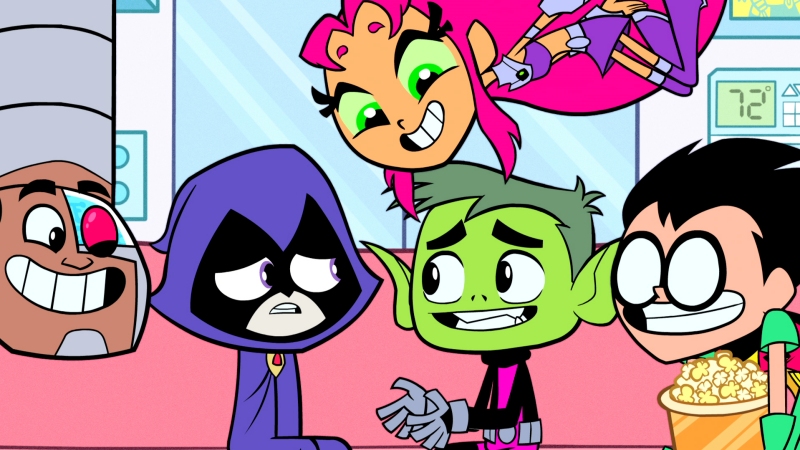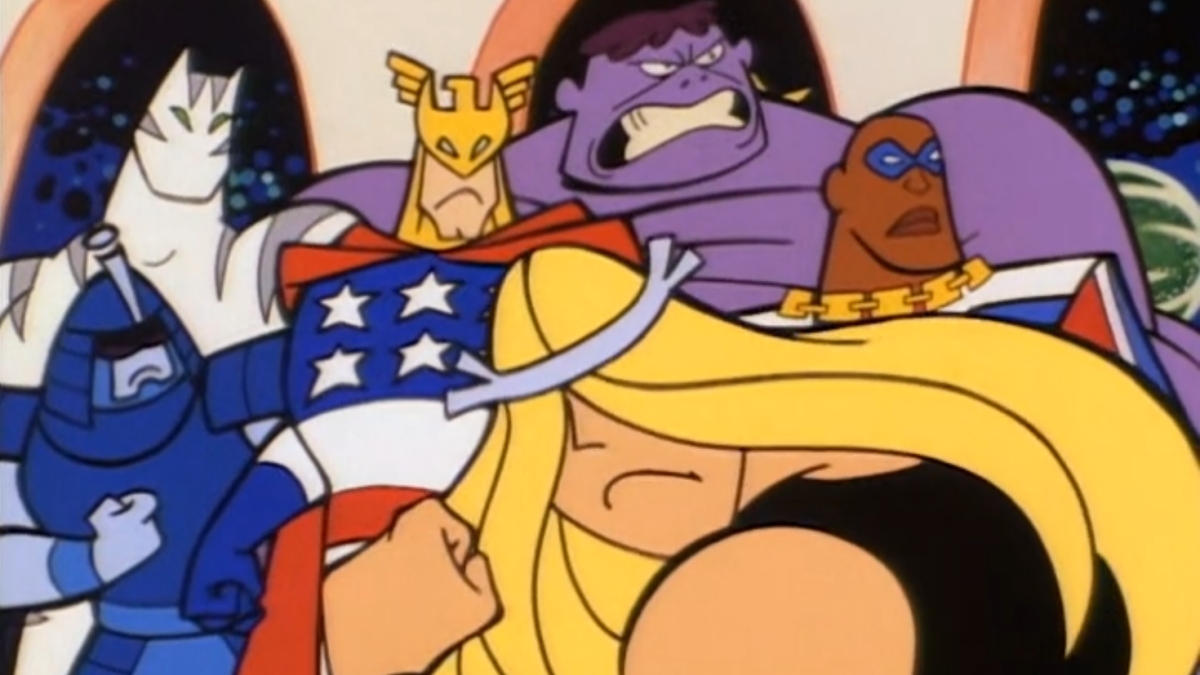I’d like to think that it’s widely accepted that 1990s animation was very good to comic book superheroes. We had a genre-changing Batman: The Animated Series, the deep and socially relevant X-Men: The Animated Series, and two expanded cartoon universes that came out of each one. But there was one superhero cartoon, neither DC or Marvel, that sticks out to me for being a bit underused and well before its time.
I want to take a second to talk about the Justice Friends.
The original two-season run of Dexter’s Laboratory not only focused on the main misadventures of the boy genius and his bratty sister Dee Dee, but it had two side-cartoons that popped up here and there. One was Dial M for Monkey, where it turned out Dexter’s lab monkey was secretly superpowered and spent his time fighting world-threatening enemies behind Dexter’s back. The other was the Justice Friends, an animated sitcom about three superheroes who shared an apartment.
The Justice Friends had only nine shorts in the show’s run outside of appearances in the main Dexter cartoons and Dial M for Monkey. Outside of a guest appearance on Powerpuff Girls in 2002 and cameos in the Cartoon Network-based knockoff of Super Smash Bros., we haven’t seen the Justice Friends in the spotlight in decades.
And man. If anyone needs a revival, it’s these guys.
The main three Justice Friends were made up of Major Glory, Val Hallen, and the Infraggable Krunk. Major Glory acted as a long-winded patriot, decked out in red, white, and blue. The metalhead Val Hallen wielded his magic electric guitar and spoke in a cross between Shakespearean English and surfer dialect. The Infraggable Krunk was a purple rage monster in torn, green pants and basically had the mind of a child.
In other words, this cartoon was a parody of Captain America, Thor, and the Hulk. It was a jab at Avengers back in a time when nobody cared about the Avengers!
In other episodes, we’d even see further members of the team. Living Bullet, despite his super-speed, was obviously designed as a take on Iron Man, down to the rectangular eyeholes. Capital G could increase his size at will like Giant Man. There was a Scarlet Witch stand-in named Miss Spell. Phan Tone was blatantly Vision.
They even had White Tiger! While Marvel does in fact have a superhero named White Tiger, this guy was a take on Black Panther. Imagine that. Coming up with a Black Panther parody for your cartoon and not knowing that this would be incredibly relevant in 20 years.
While Avengers movies are the biggest thing these days, it’s a major whiplash to remember that the 90s were a blind spot to the brand. Unless you were big into comics, the closest thing you got to a real Avengers cartoon around this time was the season of Iron Man when Force Works was a thing.
Despite all the animated Marvel crossovers, we didn’t get an actual Avengers cartoon until the very end of the ’90s going into 2000. Avengers: United They Stand was not only the last gasp of the Marvel Animated Universe, but it was a strange, strange short-lived series. It focused entirely on the B and C-list Avengers, some who still haven’t appeared in the Marvel Cinematic Universe, and treated Captain America, Iron Man, and Thor as these untouchable legends who were too special and busy to appear on the show.
The opening credits ended with a group shot, followed by a half-second pan to show the Big Three above…
I don’t think Thor ever showed up in those 13 episodes.
The Justice Friends mainly existed for two kinds of storytelling. In their own cartoons, they acted like the weird Hanna Barbera shows from the ’70s that had laugh tracks. The trio would deal with mundane sitcom stuff (visiting relative, dating situation, arguing over what to watch on TV, trying to get a good night’s sleep) with a superhero twist. For example, they would go with the TV trope of trying to DIY on fixing a toothache instead of seeing a dentist. EXCEPT it’s Krunk and while having a Dorito shard digging into his tooth will cause him intense pain, removing said tooth is nearly impossible due to his invulnerability. It’s not the kind of situation where you can just tie it to a door and slam it.
Outside of the Justice Friends cartoons, their appearances would paint them as half-competent crime-fighters most of the time. It’s there that we got their three most memorable appearances. There’s a quick fake commercial for Justice Fruit Pies starring Major Glory that’s painted as a parody to the old Hostess comic book ads from the 70s and 80s (which all late-90s kids are familiar with, right?).
In the ever-memorable Dial M for Monkey episode “Rasslor,” a cosmic wrestler voiced by Randy Savage comes to Earth and bases his judgement of humanity’s survival on whether or not their greatest heroes can best him in combat. The Justice Friends each give it a go and lose, leaving things to Monkey. Strangely, this is based on the comic Marvel Two-in-One Annual, but it’s not so much a parody as a blatant retelling with different characters. An issue of Deadpool Team-Up featuring Thing blatantly calls it out when a Randy Savage-like alien invades a wrestling show.
Then there’s “Last But Not Beast,” the original finale to Dexter’s Laboratory. This full half-hour storyline has Dexter accidentally unleash a vicious kaiju upon Japan. In the end, the creature is taken down by the joint efforts of Dexter, his family, and Monkey, but before all that, we see the Justice Friends fight the beast and lose horribly. It’s a huge comedy of errors where Capital G can only grow to a fraction of the kaiju’s height and nobody can dent the stupid thing. They’re finally done in when Krunk tries to throw the monster into space, but it doesn’t break escape velocity and instead crushes the heroes.
Read more
While Dexter’s Laboratory came back for another two seasons later on, the Justice Friends only made one appearance. In “Dexter’s Wacky Races,” various characters from the show take part in a big Wacky Races parody and this includes a hot rod driven by the three main Justice Friends. They ultimately don’t have a lot to do in this adventure (though more than Monkey and Honeydew, who are practically forgotten about by the writers), but it’s nice to see them pop up one last time.
Five years later, Iron Man would be released in theaters and everything would change. Now the characters Major Glory, Val Hallen, and Krunk are based on are part of the most money-making movie in film history. And yet, they’re obscure footnotes in Cartoon Network’s pantheon.
When I got to talk to Rob Paulsen about the return of Animaniacs recently, I brought up my interest in seeing the Justice Friends make a comeback. Paulsen, the voice of Major Glory (describing his performance as, “a combination of Fred Baxter and Robert Stack”), seemed pretty stoked about the character and agreed that creator Genndy Tartakovsky was well ahead of the curve.
“We were having just a freaking hoot,” Paulsen remarked, “and I was looking at Genndy going, ‘Dude. You’re way younger than I am.’ He’d been, I don’t know, maybe not way younger. He’s probably 50 now. But I said, ‘This is very hip. I mean, you’re just Marveling out.’”
But would a Justice Friends revival truly work in this decade? I mean, can you imagine a show in this day and age about comedic superheroes coexisting as dysfunctional roommates when they aren’t being semi-competent in saving the day? How could such a show be a success and—
Wait a second…

Huh.
Well. At least if they brought back Justice Friends we won’t have people moaning about how it’s been turned into an atrocity compared to the source material.


